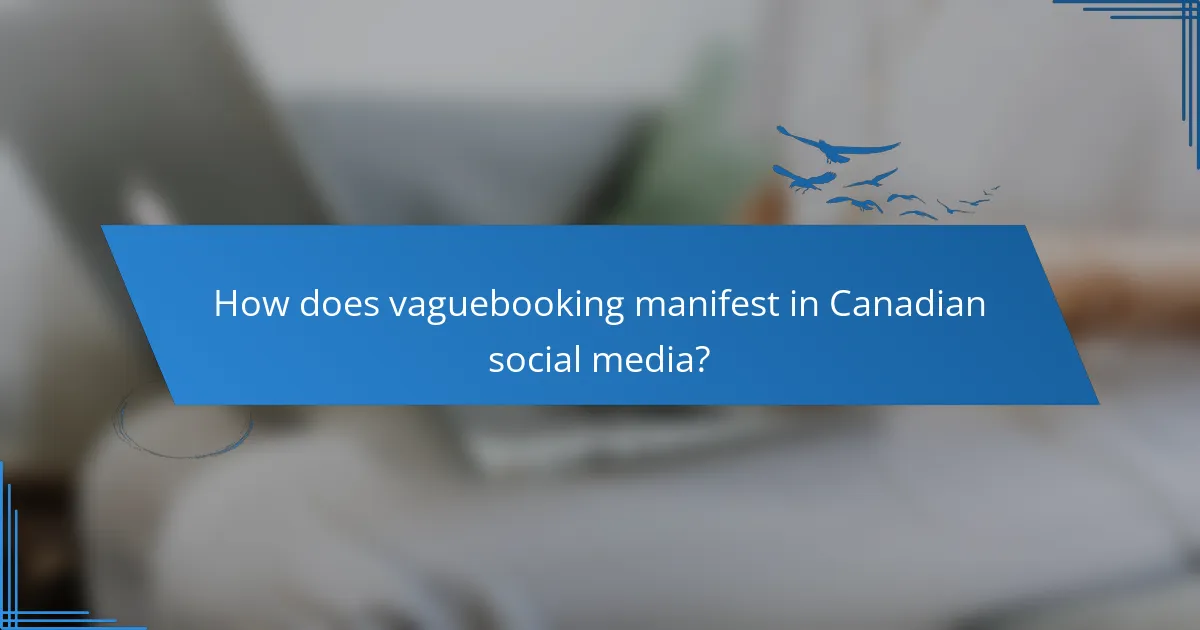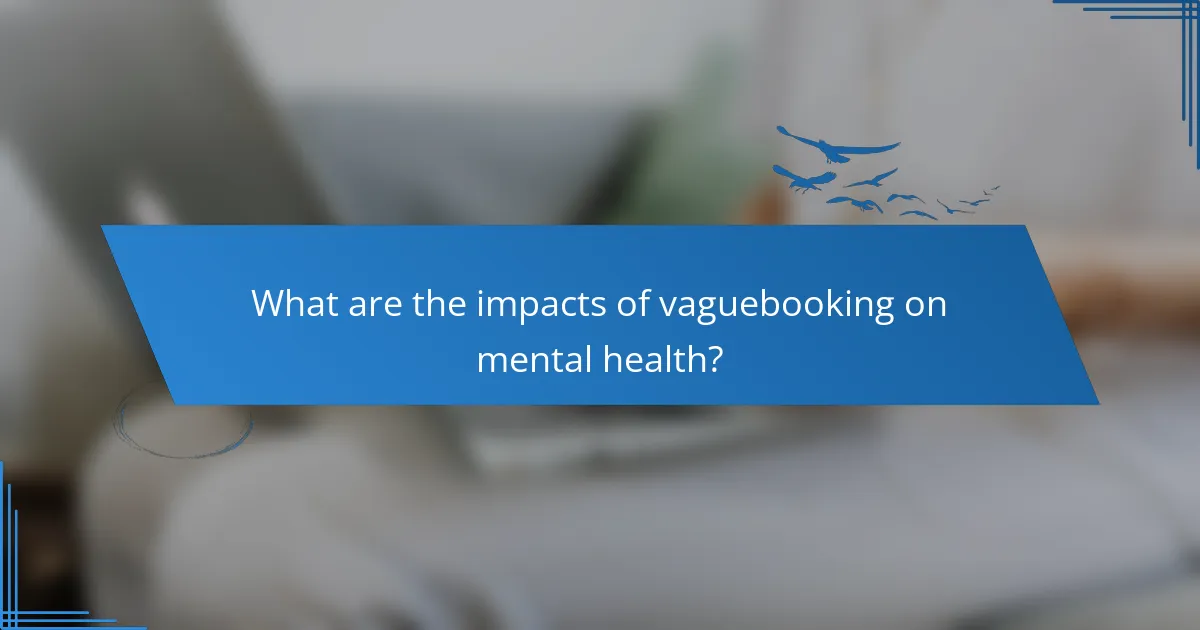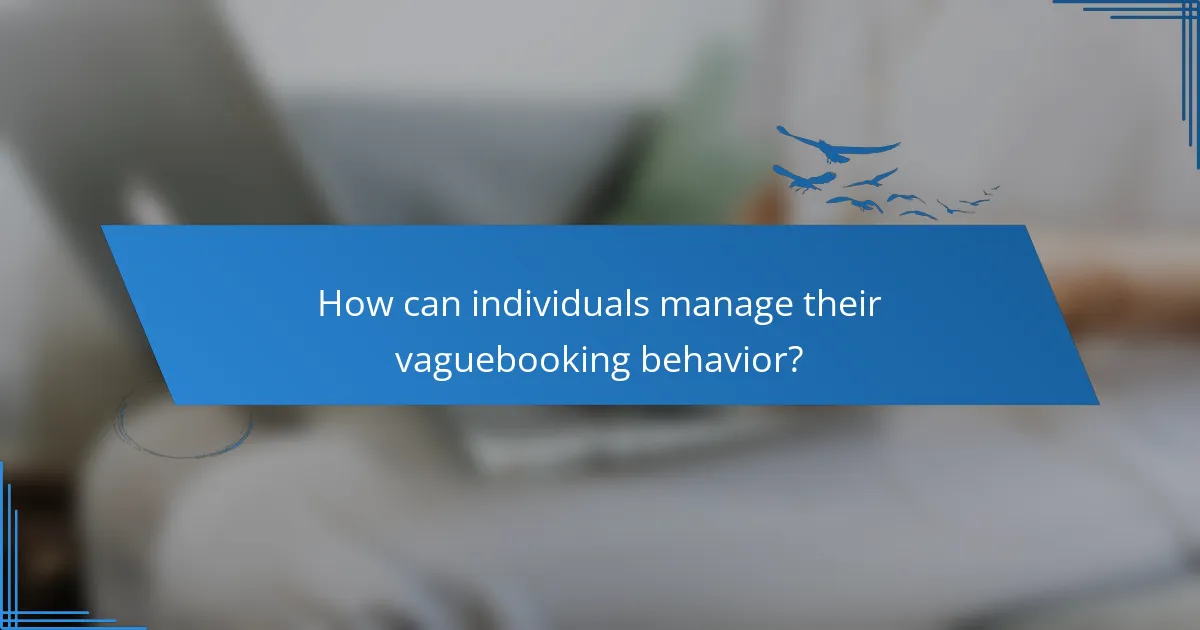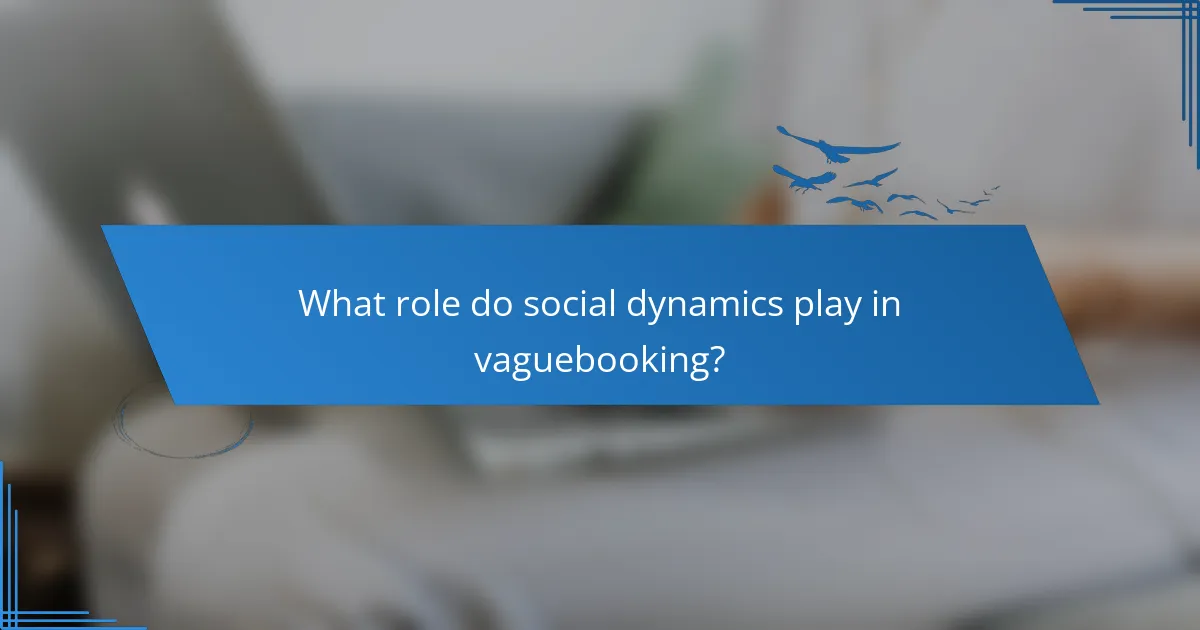Vaguebooking, a phenomenon prevalent in Canadian social media, involves posting indirect or unclear messages that seek emotional validation while withholding specific details. This behavior often arises from psychological needs for connection and the fear of missing out, prompting users to share cryptic posts that invite speculation and engagement. However, the ambiguous nature of these posts can negatively impact mental health, leading to increased anxiety and lowered self-esteem among both the poster and their audience.

How does vaguebooking manifest in Canadian social media?
Vaguebooking in Canadian social media often appears as indirect or unclear posts that seek emotional validation without providing specific details. Users may share cryptic messages that hint at personal struggles or feelings, inviting curiosity and engagement from their friends and followers.
Subtle emotional expressions
Subtle emotional expressions in vaguebooking can include posts that convey feelings of sadness, frustration, or confusion without explicitly stating the cause. For example, a user might post, “Feeling lost today,” which invites concern and support from their network. This indirect approach allows individuals to express their emotions while maintaining a level of privacy.
These expressions often resonate with others who may feel similarly, creating a sense of community among those experiencing similar challenges. However, it can also lead to misunderstandings if the audience misinterprets the emotional tone.
Ambiguous status updates
Ambiguous status updates are common in vaguebooking, where users share thoughts or feelings that are open to interpretation. A typical post might read, “Some people just don’t get it,” leaving friends guessing about the specific situation or individual being referenced. This ambiguity can generate discussions and speculation among followers.
While these updates can foster engagement, they may also frustrate those who prefer clarity. Users should consider balancing their need for validation with the potential for confusion among their audience.
Indirect communication styles
Indirect communication styles in vaguebooking often manifest through the use of metaphors or allusions rather than straightforward statements. For instance, a user might share a quote about betrayal without directly addressing a specific incident. This style can create intrigue but may also dilute the intended message.
To effectively navigate this communication style, users should be mindful of their audience’s ability to decode their messages. Clearer communication may be more effective in fostering genuine connections, while still allowing for personal expression.

What psychological needs drive vaguebooking in Canada?
In Canada, vaguebooking often stems from psychological needs for validation, social connection, and the fear of missing out. These motivations lead individuals to post ambiguous messages that invite speculation and engagement from their social circles.
Validation and reassurance
Many users engage in vaguebooking to seek validation and reassurance from their peers. By posting unclear statements, they create opportunities for others to respond with supportive comments, which can boost their self-esteem. This need for external affirmation is particularly pronounced in social media environments where likes and comments serve as immediate feedback.
For instance, a person might post, “Feeling overwhelmed today,” prompting friends to reach out and offer encouragement. This interaction can provide a sense of comfort and belonging, fulfilling the user’s emotional needs.
Fear of missing out (FOMO)
Vaguebooking is often fueled by the fear of missing out, as individuals want to remain relevant in their social circles. By posting ambiguous updates, they can generate curiosity and engagement, ensuring they stay connected with their friends. This behavior can be particularly strong among younger Canadians who are more attuned to social media dynamics.
For example, a post like “Can’t believe this happened!” can spark conversations and inquiries, allowing the poster to feel included in ongoing social narratives. This tactic helps mitigate feelings of exclusion and enhances their social presence.
Desire for social connection
The desire for social connection drives many to vaguebook, as it serves as a tool for initiating conversations and fostering relationships. By posting vague messages, individuals can invite dialogue and interaction, which can strengthen their social ties. This is especially relevant in a diverse country like Canada, where maintaining connections across various communities is valued.
For instance, a vague post about a personal experience can lead to friends sharing their own stories, creating a sense of camaraderie. However, it’s essential to balance this desire with clarity to avoid misunderstandings and ensure meaningful interactions.

What are the impacts of vaguebooking on mental health?
Vaguebooking can significantly affect mental health by increasing feelings of anxiety, lowering self-esteem, and fostering social comparison. These impacts stem from the ambiguous nature of vague posts, which often leave readers guessing about the poster’s emotions and intentions.
Increased anxiety levels
Vaguebooking can lead to heightened anxiety levels for both the poster and their audience. When individuals post unclear messages, it creates uncertainty and speculation, prompting friends and followers to worry or overthink the situation. This can result in a cycle of anxiety as users feel pressured to respond or interpret the vague content.
To mitigate anxiety, individuals should consider being more explicit in their social media communications. Clearer posts can reduce misunderstandings and the associated stress that comes from guessing what someone might be feeling.
Lower self-esteem
Engaging in vaguebooking may contribute to lower self-esteem, particularly if individuals seek validation through ambiguous posts. When the desired attention or responses do not materialize, it can lead to feelings of inadequacy or rejection. This cycle can erode self-worth over time.
To combat this, individuals should focus on building self-esteem through direct communication and seeking support from trusted friends rather than relying on social media for validation. Acknowledging personal achievements and strengths can also help boost confidence.
Social comparison effects
Vaguebooking often triggers social comparison, as users may interpret vague posts in relation to their own experiences. This can lead to feelings of envy or inferiority, especially if they perceive others as having more fulfilling lives. The lack of context in vague posts exacerbates this issue, making it difficult to gauge reality.
To reduce negative social comparison, users should remind themselves that social media often portrays an idealized version of life. Engaging in self-reflection and focusing on personal goals can help maintain a healthier perspective on social interactions online.

How can individuals manage their vaguebooking behavior?
Individuals can manage their vaguebooking behavior by establishing clear communication goals, seeking direct feedback from friends, and practicing self-reflection. These strategies help ensure that social media interactions are meaningful and reduce the need for ambiguous posts that may seek validation.
Setting clear communication goals
To effectively manage vaguebooking, individuals should define what they want to communicate before posting. This could involve identifying specific emotions or situations they wish to share, which helps to create more direct and meaningful content.
For example, instead of posting a cryptic message about feeling “down,” one might share a specific challenge they are facing. This clarity not only fosters better engagement but also invites more constructive responses from friends.
Seeking direct feedback from friends
Encouraging friends to provide honest feedback can help individuals understand how their vague posts are perceived. This can be done by directly asking for opinions on certain posts or discussing feelings openly in private messages.
For instance, if someone feels their vaguebooking is misunderstood, they might reach out to a close friend for clarity. This approach can lead to more supportive interactions and reduce the tendency to post ambiguously for validation.
Practicing self-reflection
Self-reflection is crucial for understanding the motivations behind vaguebooking. Individuals should regularly assess why they feel the need to post ambiguously and what emotional needs they are trying to fulfill.
Keeping a journal or engaging in mindfulness practices can help clarify these feelings. By recognizing patterns in their posting behavior, individuals can make more intentional choices about how they communicate on social media.

What role do social dynamics play in vaguebooking?
Social dynamics significantly influence vaguebooking, as individuals often seek validation and connection through ambiguous posts. These interactions are shaped by peer behaviors, group norms, and the visibility of posts within social media platforms.
Peer influence on posting behavior
Peer influence is a powerful driver of vaguebooking, as individuals often mimic the posting habits of their friends and social circles. When someone observes a peer receiving attention or validation for a vague post, they may feel encouraged to adopt similar behaviors to gain social approval.
This influence can create a cycle where vaguebooking becomes a norm within a group, leading to more individuals engaging in this behavior to fit in or stand out. The desire for social acceptance can overshadow the need for clarity in communication.
Group validation mechanisms
Group validation mechanisms play a crucial role in vaguebooking, as individuals often seek affirmation from their peers. When vague posts receive likes or comments, it reinforces the poster’s feelings of worth and belonging within the group.
This validation can lead to a feedback loop, where individuals continue to post ambiguously to elicit further responses, creating a reliance on group approval for self-esteem. The emotional rewards associated with these interactions can make vaguebooking an appealing strategy for social engagement.
Social media algorithms and visibility
Social media algorithms significantly impact the visibility of vague posts, often prioritizing content that generates engagement. Vaguebooking can attract attention due to its ambiguous nature, prompting users to comment or react in an attempt to decipher the meaning behind the post.
This increased engagement can lead to higher visibility, encouraging users to post vague content more frequently. Understanding how algorithms work can help individuals navigate their posting strategies, balancing the desire for engagement with the need for meaningful communication.

What are the ethical considerations of vaguebooking?
Vaguebooking raises several ethical concerns, primarily revolving around privacy and the potential impact on interpersonal relationships. Users often share ambiguous posts seeking validation, which can lead to misunderstandings and emotional distress for both the poster and their audience.
Privacy concerns
Vaguebooking can compromise personal privacy, as users may inadvertently reveal sensitive information through cryptic messages. This lack of clarity can lead to speculation and gossip, potentially exposing individuals to unwanted scrutiny.
Moreover, the digital footprint left by vague posts can be permanent, making it difficult to control who sees this information. Users should consider adjusting their privacy settings and being mindful of their audience before posting vague content.
Impact on relationships
The ambiguous nature of vaguebooking can strain relationships, as friends and family may feel compelled to respond to unclear posts. This can create unnecessary tension and misunderstandings, as individuals may misinterpret the intent behind the vague messages.
To mitigate these effects, it’s advisable to communicate openly with loved ones instead of relying on vague posts for validation. Clear communication fosters healthier relationships and reduces the likelihood of conflict stemming from misinterpretation.
